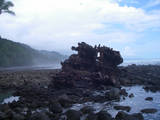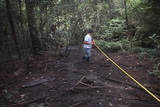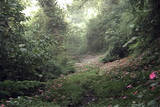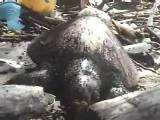Welcome to the Jungle: An Introduction to the End of the Industrial Era
Welcome to the Jungle: An Introduction to the End of the Industrial Era
An editorial
Ryan King, special to mongabay.com
July 3, 2008
-
Any economic or social system that does not benefit the natural communities on which it is based is unsustainable, immoral, and stupid. Sustainability, morality, and intelligence (as well as justice) requires the dismantling of any such economic or social system, or at the very least disallowing it from damaging your landbase.
– Derrick Jensen, Endgame
|
|
The existing state of industrial civilization has brought our planet and global populations into a worldwide crisis unprecedented in the history of life on Earth. Human activities have sent many living systems into decline or collapse, brought about the 6th mass extinction of biodiversity, upset our planet’s biogeochemical cycles, and rapidly and dangerously altered our climate. We stand at the bifurcation point of our species: whether or not we are able to question the maladaptive behaviors which have brought about these travesties and adapt on a global scale will determine the course of human evolution and the survival of a multitude of living organisms with which we share this planet. As the only reflectively conscious organism to have existed, we also hold the fate of (reflective) sentience itself in our actions. I believe our chance at pulling ourselves out of this mess is through an analytical dissection of human nature and behavior — to expose, extract, examine, revise and communicate the elements of our existence which drive us into maladaptive behaviors followed by an application of technology and action grounded in a new and emerging understanding of humanity and our position in the biosphere.
Some contemporary thinkers conclude the core ailment of our planetary destruction is the technological and structural aspects of industrial civilization. These thinkers call for destruction of these elements — physically and violently dismantling civilization – in order to achieve sustainable and stable human populations. I, however, believe the root of humankind’s misuse of resources, environmental and social instability lies primarily within cultural and behavioral realms. We are burdened by an instinctual legacy imploring unlimited propagation and consumption while disregarding long term consequences and foresight. The unsustainable facets of our cultures and civilizations are not intrinsic within the technology or infrastructure, but within the motivations, desires, and beliefs which drive us to create, build, and develop at the expense of our natural resources and living systems.

|
Aspects of our shared biological inheritance have grown and compounded into unstable cultures and societies. A sustainable future will be not be derived merely with the destruction of technology and infrastructure but in conscious behavioral adaptation to our emerging and rapidly changing environment – by applying technology in novel, creative, and radically different ways — all of which emerge only from an alternative awareness of ourselves and our roles in healthy ecosystems.
Conservation biology identifies 5 major categories of anthropogenic environmental alteration represented by the acronym “HIPPO:” Habitat destruction, Invasive species, Population, Pollution, and Overharvesting. The traditional paradigm towards addressing these issues has been in a piecemeal fashion. For example, creating and guarding reserves stops habitat destruction (though population, pollution, and invasive species may still be altering the area significantly). A “protected” area — the Monteverde Cloud Forest Preserve, for instance – does not allow habitat destruction. It is therefore assumed within the surrounded area that the reserve is safe for future generations. Unfortunately the culture of “ecotourism” encourages increasing access to the reserve and areas around it for cars, trucks, tourists and invasive species.
In general, existing conservation strategies have not succeeded. Novel modes of functioning are necessary. The details of our planetary destruction (HIPPO) are all facets of a systemic problem: the existing state of industrial civilization. We require systemic solutions. We require a profound and rapid shift from the Industrial Era to an Ecological Era.
To begin to understand why so many individuals, groups, organizations, and even experts are content to continue following the path of destruction of the natural world, our resources, and ourselves that is characteristic of past civilizations I believe we must first identify the elements and influences which have sculpted the somewhat unspoken system of values instilled into past societies and cultures. As we derive and break down these values we can begin to see the faults and misconceptions of the assumptions which have led and continue to lead industrialized cultures deeper into social and environmental chaos.
In his “A Brief History of Civilizations” Braudel explains,
“In every period, a certain view of the world, a collective mentality, dominates the whole mass of society. Dictating society’s attitudes, guiding its choices, confirming its prejudices and directing its actions, this is very much a fact of civilization. Far more than the accidents or the historical and social circumstances and beliefs, it derives from a distant past, from ancient beliefs, fears and anxieties which are almost unconscious — an immense contamination whose germs are lost to memory but transmitted from generation to generation. A society’s reaction to the events of the day, to the pressure upon it, to the decisions it must face, are less a matter of logic or even self-interest than the response to an unexpressed and often inexpressible compulsion arising from the collective unconscious.”
At the roots of our unconscious, shared mentality are biological imperatives which, through natural selection, have manifested into the behaviors characteristic of modern cultures. Sorting through the basis for these behaviors involves exploring the story of biological life on Earth from its beginning some 3.85 billion years ago though eons of change and extinctions and on into our primate evolution following all the way up until the rapid changes occurring to ourselves and our world in the current state of civilization. The deeper we understand the roots and nature of our lives and life on earth, the more clearly we can approach working solutions.
I feel strongly that the values at the foundation of most modern societies are severely flawed because they do not reflect the scientific and ecological realities of our situation as living, reciprocating facets of a materially-limited biological system. The development of technology, agriculture, civilizations, and other factors has led us away from the truth that we rely on healthy ecosystems and organisms for survival and prosperity.
Morality relies on values, values derive from ethics, and ethics should serve a shared purpose. The unconscious mentality that dominates societies through time which Braudel identifies as the controlling factor of civilizations have historically been grounded in false or incomplete visions of human existence and purpose. Capitalism for instance, rears us to believe the purpose of life is centered in the accruement of wealth. This is not a human purpose but a systemic purpose — the purpose of a set of ideas or memeplex.
Historically, the values, ethics and purpose beneath existing social systems were mostly accepted unconsciously and rarely questioned. In a world replete with resources, industrial capitalism works in the short term. Our circumstances have changed, however.
In the following series of articles, I will be traveling, filming, and documenting our environment: both at physical levels of anthropogenic destruction, natural regeneration, but also at the psychological level — that of the conscious and unconscious motivations behind human nature. Your comments are welcomed.








